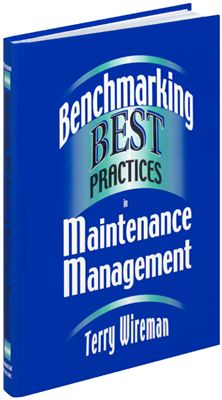Industrial Press – 2004, 231 pages
ISBN 0831131683
Maintenance. Many times the word is viewed with a negative at- titude. In almost all organizations, the maintenance function is viewed as:
a necessary evil,
a cost,
insurance
a disaster repairing function
prima donnas
Because of this attitude, too little time or effort is spent on try- ing to control maintenance activities and costs. In the past, mainte- nance has received little budgetary attention other than a nominal increase or decrease from year to year. Most organizations today are trying to increase profitability. Because maintenance expenditures make up a percentage of production or occupancy costs, attention is being tued to financial accountability for maintenance expenditures. As organizations audit their maintenance expenses, they find a sizable amount of money spent with little management con- trol. Proper management controls must be applied to maintenance if costs are to be curbed. But to successfully control maintenance, proper management policies and practices must be instituted. Again, many organizations have tried to use standard production or facilities-oriented methods to control maintenance. This has not and will not be successful.
Maintenance is a unique business process. It requires an approach that is different from other business processes if it is to be successfully managed. The purpose of this book is to present in- sight into what is required to manage maintenance. The book cannot provide a complete answer to every maintenance management problem. However, it will provide a framework with options, allowing maintenance decision makers to select the most successful way to manage their business.
ISBN 0831131683
Maintenance. Many times the word is viewed with a negative at- titude. In almost all organizations, the maintenance function is viewed as:
a necessary evil,
a cost,
insurance
a disaster repairing function
prima donnas
Because of this attitude, too little time or effort is spent on try- ing to control maintenance activities and costs. In the past, mainte- nance has received little budgetary attention other than a nominal increase or decrease from year to year. Most organizations today are trying to increase profitability. Because maintenance expenditures make up a percentage of production or occupancy costs, attention is being tued to financial accountability for maintenance expenditures. As organizations audit their maintenance expenses, they find a sizable amount of money spent with little management con- trol. Proper management controls must be applied to maintenance if costs are to be curbed. But to successfully control maintenance, proper management policies and practices must be instituted. Again, many organizations have tried to use standard production or facilities-oriented methods to control maintenance. This has not and will not be successful.
Maintenance is a unique business process. It requires an approach that is different from other business processes if it is to be successfully managed. The purpose of this book is to present in- sight into what is required to manage maintenance. The book cannot provide a complete answer to every maintenance management problem. However, it will provide a framework with options, allowing maintenance decision makers to select the most successful way to manage their business.

